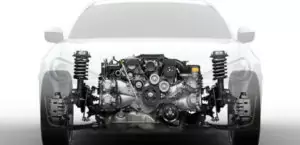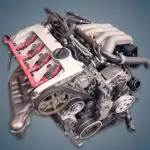The 1.9-liter diesel engine Audi AVG 1.9 TDI was produced by the company from 1999 to 2001 and was installed on many models of the concern, but the most famous were the A4 B5 and A6 C5. This power unit is essentially a slightly improved version of a diesel engine with an AFN index.
The EA180 series also includes: 1Z, AFN, AHF, AHU, ALH, AVG, AKU, AEY.
Specifications
| Production years | 1999-2001 |
| Displacement, cc | 1896 |
| Fuel system | direct injection |
| Power output, hp | 110 |
| Torque output, Nm | 235 |
| Cylinder block | cast iron R4 |
| Block head | aluminum 8v |
| Cylinder bore, mm | 79.5 |
| Piston stroke, mm | 95.5 |
| Compression ratio | 19.5 |
| Features | SOHC, intercooler |
| Hydraulic lifters | yes |
| Timing drive | belt |
| Phase regulator | no |
| Turbocharging | VGT |
| Recommended engine oil | 5W-40 |
| Engine oil capacity, liter | 4.3 |
| Fuel type | diesel |
| Euro standards | EURO 2 |
| Fuel consumption, L/100 km (for Audi A4 2000) — city — highway — combined |
6.9 4.3 5.2 |
| Engine lifespan, km | ~420 000 |
The engine was installed on:
- Audi A4 B5 (8D) in 1999 – 2000;
- Audi A6 C5 (4B) in 1999 – 2001;
- Volkswagen Passat B5 (3B) in 1999 – 2000;
- Volkswagen Sharan 1 (7M) in 1999 – 2000.
Disadvantages of the Audi AVG engine
- The cause of thrust failures is most often pollution and wedge geometry of the turbine.
- A clogged EGR valve may also be the culprit for unstable engine operation.
- If you have an entire sump in oil, carefully inspect the lower flange of the crankcase ventilation tube.
- The source of the antifreeze leak here is usually a plastic cooling tee.
- At high mileage, valve seat burnout and loss of compression are common.






